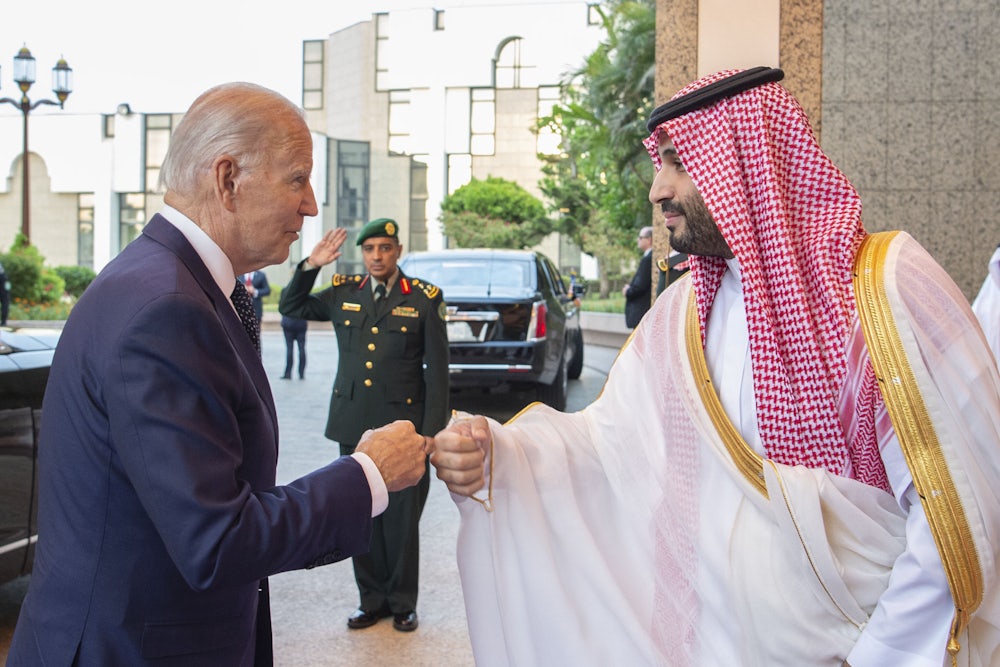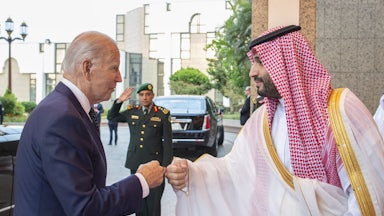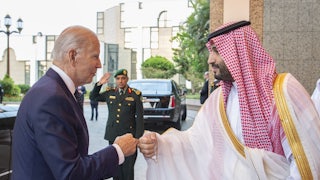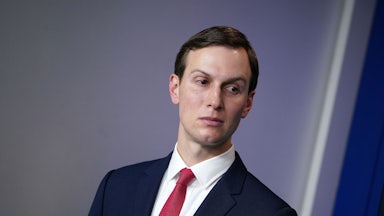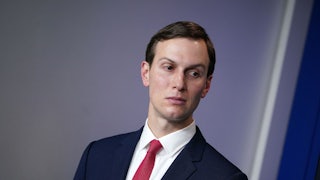In early 2021, just a few weeks into President Joe Biden’s first term as president, his administration released a bombshell report about the 2018 murder of Washington Post columnist Jamal Khashoggi. As the text revealed, the man ultimately responsible for Khashoggi’s death was none other than Saudi Arabia’s Crown Prince Muhammed bin Salman, or MBS. According to the assessment, MBS “approved” Khashoggi’s murder and supported “using violent measures to silence dissidents abroad.”
The move was part of a far broader salvo from the Biden administration against MBS’s regime, which included things like freezing arms sales and lifting the “terrorist” designation for Yemen’s Houthi rebels. All of it built toward Biden’s aim of completely restructuring the U.S.-Saudi relationship—and turning MBS, as Biden said, into a “pariah.”
But nearly two years on, it’s clear that the effort to isolate MBS has effectively failed. If anything, after the Biden administration’s much-ballyhooed opening gambit against MBS, Washington’s relations with Riyadh have drearily reverted to form—leaving MBS in an even stronger position than he was from the outset. And now, with Russia’s Vladimir Putin flailing in Ukraine and China’s Xi Jinping facing more domestic unrest than he’s seen in years, it’s safe to say that no kleptocratic dictator had a better year than this purported pariah.
Part of MBS’s extraordinary 2022 stemmed, in part, from realities beyond his control. For instance, with Russia’s self-inflicted implosion in Ukraine gutting Moscow’s place as a global hydrocarbon power, Saudi Arabia’s leverage over oil competitors has only increased since the expanded war began. Not only was MBS able to step in and offer Moscow a lifeline, investing hundreds of millions of dollars in Russia’s remaining major energy companies, but Riyadh even increased imports from Russia—allowing MBS to export more Saudi oil and rake in more money in the process. (MBS’s family’s wealth is estimated in the trillions, and there’s little reason to believe MBS doesn’t have the final say over its control.)
Then, in October, Riyadh revealed just how much leverage it now maintains over Western consumers as well. Using its new partnership with Moscow, MBS and Saudi officials convinced the OPEC-Plus cartel to cut overall oil production output—effectively gutting Washington’s efforts to stave off high gas prices. The latter move was especially galling for the White House, coming after what it thought was a secret agreement with MBS to increase oil production and thus keep pump prices low. Yet there was little Washington could do in response, with consumers forced to swallow the higher prices.
Biden threatened to unleash vague “consequences” on the Saudis following their OPEC-Plus stunt. But two months later, it’s still unclear what those “consequences,” if any, will be. Much of that can perhaps be attributed to the other geopolitical waters the White House has to navigate, not least out of Moscow and Beijing. But there are other forces at work: Just as Riyadh has managed to turn shifting geopolitical contours to its own benefit, MBS has managed to consolidate his own power base in Riyadh—and has extended his networks of influence abroad, especially among key sectors across the West.
Look at what’s taken place domestically over the past year. In September, MBS officially became Saudi Arabia’s prime minister, effectively formalizing his status as the de facto head of the kingdom. Any questions about his role—or his future—in the Saudi governance structure have been effectively eliminated. So too have any domestic threats to his power. And as seen with Saudi Arabia’s mass execution of over 80 men in a single day earlier this year, any questions about MBS’s penchant for violence have likewise ceased.
Abroad, MBS has overseen a wholesale effort to recast his country’s image from a bastion of intolerance and extremism to one that is far more chic, and far more appealing, than previously imagined. Working with Western consultancy firms like McKinsey and public relations firms like Edelman, Saudi Arabia under MBS has run a master class in “reputation laundering” and in using Western services to transform its identity from that of a kleptocratic dictatorship into a regime ready to be welcomed into polite society. Obviously, many other odious states are engaged in efforts to whitewash their reputations, but even among the broader world of dictatorships, MBS and the Saudi regime stand apart.
The latest—and potentially most successful—iteration of these “reputation laundering” schemes came earlier this year, when Saudi officials announced the creation of LIV Golf. Set to be a competitor to the PGA Tour, the Saudi-financed tour has already poached some of the biggest names in golf, including Phil Mickelson. (As Tiger Woods said, the PGA Tour simply “can’t compete dollar for dollar” with the Saudi-backed project.) But even if LIV Golf doesn’t surpass the PGA, the sudden Saudi entrée into the rarefied world of golf has already helped MBS establish Saudi Arabia “as legitimate in the eyes of decision makers and governments around the world,” one sport and geopolitical economy professor said.
Plus, there’s one other name attached to both LIV Golf and MBS’s broader influence networks abroad: Donald Trump. Trump has already agreed to host at least two of the Saudi tournaments at Trump’s courses. The agreement is unsurprising for any number of reasons, not least for Trump’s affinity for kleptocratic wealth and for his cozy relationship with MBS. The ties between the two figures are hardly a secret; as Trump claimed, he “saved [MBS’s] ass” after the revelations about Khashoggi’s murder came out.
Besides the new golfing links, the financial ties between Trump and MBS reached new heights earlier this year, when journalists discovered that Trump son-in-law Jared Kushner had successfully landed billions of dollars in Saudi financing for his new private equity firm. While American private equity firms have long been sieves for kleptocratic wealth—thanks in large part to a decades-long exemption from basic anti–money laundering checks—the deal between Kushner and the Saudis is plumbing new kleptocratic depths.
Not only is the deal staggering in scope, and far larger than anything any former American official or family member has received from a dictatorship, but the details of the deal somehow make it appear even worse. Kushner explicitly pitched political access as part of the deal, doing little more than point to access to Trump as reason to invest in the private equity firm. The pitch was so unsubtle that the Saudi panel screening the investments objected outright, not least because of the “public relations risk” that could come with the deal. MBS stepped in and overrode those concerns—and directed billions of dollars directly into Kushner’s firm.
Again: None of this is especially surprising. It’s an open secret that MBS widely prefers Trump to Biden (or any other Democrat), with MBS outright mocking Biden in private, according to The Wall Street Journal. But the Saudi leader is having less and less reason to be concerned with Biden’s White House with each passing day. Not only did Biden’s efforts to transform MBS into a “pariah” fall flat, but last month the Biden administration announced that MBS would be immune from any prosecution over Khashoggi’s death. The move was met with broad criticism, including from Democrats. As the Senate Foreign Relations Committee tweeted, “Recommending immunity for anyone complicit in this crime is a great disappointment. Autocrats can’t be led to believe they can get away with attacking & murdering journalists & dissidents.”
But after the year MBS has had, he has no cause to believe otherwise. Rolling in wealth, expanding Saudi Arabia’s geopolitical heft, bankrolling leading American politicos, and getting away with literal murder: If this is what life like a “pariah” looks like, then MBS will be happy to live and rule as a “pariah” for decades more.
